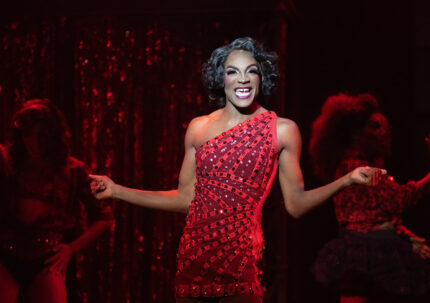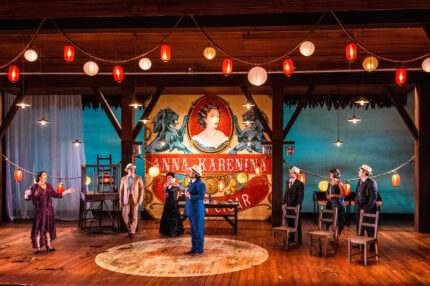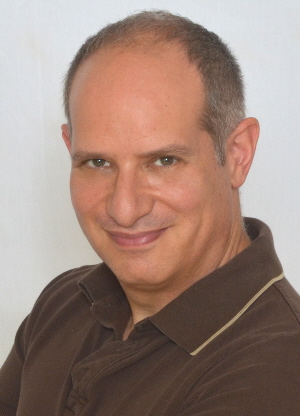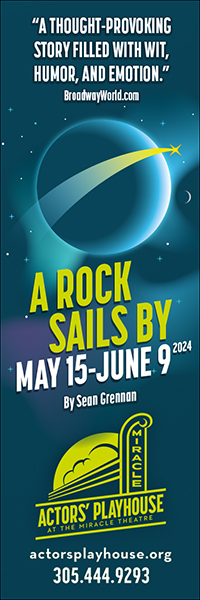
Elijah Word as Lola in Slow Burn Theatre Company’s Kinky Boots
What Happened, What Is Happening, What May Happen
PART FOUR: DEFYING GRAVITY: THE PIVOT AND THE FUTURE
By Bill Hirschman
The road back, its topography already sketched out by the past season and the current one, is fraught with hopes and knee-shaking fear. And underlying it all is the sense that none of the crises are remotely over. To begin with, nothing is certain if there’s a recession or another virus outbreak.
Unlike a well-crafted play, there is no third act denouement, no finale. In the spring of 2023, planners know what the next season likely will look like but not the two after that.
Still, a common, almost universal prognosis emerged. Almost simultaneously, most observers were optimistic that their unique, irreplaceable virtues of live professional on-stage theater would survive and prevail. But most people interviewed were less certain about its future in the pecking order of art let alone entertainment.
Almost everyone said the weak ticket sales of the past two seasons might be a fear factor of Covid transmission. But they also murmured the dark toxic secret that perhaps people have gotten used to not going to theater, preferred staying home and watching Netflix. And that the audience—especially the Boomers, Gen X Y and Z — might not come back. Period.
But there were and continue to be strong signs of justifiable hope.
“I think it’s a good time for arts and culture,” said Phillip Dunlap, director of the Broward County Cultural Division. “If you look historically at when we had cultural renaissance, it’s after Big Pandemics, right after The Plague, that’s when the Renaissance era happened. So you go into this immense period of darkness and uncertainty and turmoil, and you emerge with this great pent up creative energy.”
Start with the bottom line: Some companies went into months of hibernation, but other than one small company already planning to fold before the virus, Measure for Measure, not a single company collapsed. Every one emerged to perform again, albeit some much later than others. But by December 2022, only one was going back into hibernation with little likelihood of returning.
Indeed, in January, a new professional troupe opened a three-show Broadway musical season at Lauderhill Performing Arts Center, a joint effort by the City of Lauderhill and Arts Center Management, a national company.
Money invested in major projects such as the Maltz Jupiter Theatre’s massive $36 million expansion began to open. (It continues to plan for the $10 million construction of a black box adjunct that will specialize in less traditional fare.) Island City Stage in Wilton Manors put in new more comfortable seats, redid the dressing room and installed better air conditioning.
Again, while some performances still have soul-crushingly sparse turnout, others have a few sold out performances during a run. For instance, Ronnie Larsen’s gay-themed plays sell to full houses in its small venue in Wilton Manors. Miami New Drama’s musical revue Papá Cuatro and Nilo Cruz’s drama Anna in the Tropics this season were popular enough to extend their runs, as did Palm Beach Dramaworks’ 12 Angry Men.

Anna in the Tropics at Miami New Drama
Slow Burn Theatre Company in Fort Lauderdale, which had such a terrifying lack of ticket sales last season, marked December’s Footloose as the top money maker of its entire 12-year history.
Companies that lost their recent and planned new homes found new digs, such as New City Players settling in Island City Stage in Wilton Manors.
And a new crowd of potential patrons are moving into the region, Dunlap said, “especially in this downtown corridor in Fort Lauderdale there’s a ton of buildings being built, a ton of people moving in and those folks are demanding world class arts and culture opportunities.”
SOMETHING’S COMING: WHAT WILL YOU SEE
Opinions vary wildly about what you will see and how you will see it because some companies and artists see this as a turning point. They deem it an opportunity for a sea change to define the future and, in turn, secure a future for the art form. Others wonder if short-term survival will rely on a return to pre-pandemic “normal.”
“It’s going to be years before we get back to where we were because that status quo has upset so much that, like I said, people just aren’t in the same place mentally, physically, geographically, whatever it is that they used to be,” Dunlap said.
But leaders like Nicholas Richberg, managing director of Miami New Drama, press, “I think the whole point is to not go back to that normal, but to actually learn something that’s sustainable and have sustained change as an industry that frankly, in many ways has been historically self-protective and sometimes exploitive.”
As examined in the Part 3 report, the reflective period of self-examination fueled challenging questions about the future regarding social justice, racial equity, sexual abuse, working conditions, what shows would be seen and not seen, who would be in them, how to reach out to a wider community and potential future audiences, and simply whether theater can be fiscally sustained in anything but small amateur efforts.
“The reset means smaller,” said Geoffrey Short, artistic director of Pembroke Pines Theatre of the Performing Arts, once a community theater but now a professional company continuing to stage large-scale musicals. “There’s going to be for the foreseeable future, even when things open up, there’s going to be smaller audiences. We still need to take precautions. We still need to be safe. That means less income, but it also means we can then take some risks that we might not have taken before because what do we have to lose? So when we’re not as concerned with filling every seat because we can’t, then we can try some things. And that means new work development. That means new player development.”
Certainly, many companies’ coming season and likely next few seasons will see stories with smaller casts, simpler production values, more digitized music, shorter runs. Expect more plays and musicals about diverse populations and with more BIPOC performers serving in both race-neutral roles and even cross-racial casting. Playbills will reflect more plays by diverse and female playwrights and directors.
Audiences will need to recalibrate their expectations.” Even if it’s two people on a stage with a chair and a light, we will love that,” Short said. “We have to get more creative with less audience, with less money, with less time, with less everything. And we need to see how that magic can be restored on a more modest level.
New work, some locally commissioned as Theatre Lab does currently in Boca Raton with an entire season, will likely rise as younger audience seek stories, themes and issues reflecting their lives.
“I feel like theater remains viable and relevant… when the writing is reflecting our time and that writing needs to continue happening for theater to stay alive,” said Elizabeth Price, now associate director at New City Players. “It begins to deal with what’s happening in our society in the space of art…. And that doesn’t have to be it’s like a heavy weighted issue play. It can be satire. It can be a different way of looking at love in romantic comedies that involve people we don’t usually see in romantic comedies.”
But other companies, unnerved by the fiscal threat to their immediate future, will do everything possible to return to what their past audiences have steadfastly supported with their ticket sales and charitable contributions, even maintaining the illusion of lush large productions.
“There are people sitting there saying ‘Oh, my God, why are these people doing a Little Shop of Horrors and Footloose and all that?,” Artistic Director Patrick Fitzwater said of the current season at Slow Burn Theatre that had nurtured a reputation for inserting musicals audiences aren’t familiar with or which have inherent flaws such as Carrie. “The fact is you have to do something that’s going to sell and you have to make peace with yourself.”
Boca Stage’s Artistic Director Keith Garsson agreed, “Assuming that we’re coming out of it, the idea was let’s lighten up. Let’s throw more comedic material in, and the ones that are dramas. Let’s not make them so depressing.” This season it alternates the dark play Time Alone with a female version of The Odd Couple.
Broadway Across America’s local tours always have been dictated in large part by regular surveys of subscribers to a list of potential titles, said President Susie Krasja.
Many individual theaters in other cities traditionally offer a wide array of genres and styles to attract a wide audience, but most South Florida companies are different: Most have identified a profile and stuck to it in a kind of if-we-build-it-they-will-come model that mostly has been successful. In the past, when they strayed too far too fast, their regular patrons drifted away, as occurred fatally in 2012 when the Caldwell Theatre in Boca Raton mounted superb challenging productions different from its previous fare of often recognizable mainstream or popular titles.
The result is the region is dominated by some companies that focus on hoary musicals of the ‘40s to ‘60s; some favor push-the-edge-of-the-envelope work; others commit almost solely to new work in their first and second iterations. Some companies hew to gay-centric themes, some to Latinx-centric themes. Yet, all of them including the ultra-mainstream Maltz Jupiter Theatre keep pushing gently at the expected edges with some title choices. The Maltz’s Producing Artistic Director/Chief Executive Andrew Kato has peppered freshly re-imagined musicals like Hello, Dolly! with issue-oriented dramas like Disgraced and A Doll’s House Part II. This season has Jersey Boys, Oliver and A Funny Thing Happened on the Way to the Forum balanced in the middle of snowbird season with David Lindsay-Abaire’s working-class drama, Good People.
But the Maltz’s selections now and in the foreseeable future are “strategic” for filling one of the larger auditoriums in the region. “Smaller theaters can be more daring, because there’s less risk. For us, we have to get butts in seats,” Kato said.
Theatre Lab’s artistic director Matt Stabile asked, “Are we at a point in time where (we ask) do audiences want to be entertained or do they want to be challenged?… It made me wonder if a theater company, any theater company, could get away with just doing ‘greatest hit’ things at this point in time.”

Andy Rogow
At Island City Stage, the serious play Armature last season—exploring racism, politics, homosexuality and marital relations—sold “very well” to its leaders’ pleasant surprise,” said Andy Rogow, artistic director. “But I hear people talk about plays elsewhere that were very serious or heavy. They’re like, ‘I just didn’t want to hear this right now’…. But Ronnie Larsen sells out all his stuff (comedies centered on gay sex) I know and it’s all very light. I think that’s what people really want right now. They want to have a good time.”
The company “will probably be expanding our mission just a little bit to allow us to do some plays that may not be strictly LGBTQ,” Rogow said. “We’ve been surveying our audiences and trying to get a feel for whether they’ll go along with that because there’s a real danger when you change your mission, we lose the people who are supporting you already because of your mission.”
Some people predicted a serious ebbing of classic older fare, now viewed through a socially conscious prism that might be found borderline offensive if not cripplingly outdated without some authorized tinkering. Indeed, last year, the 1987 retooled musical Anything Goes was further rewritten to eliminate Chinese ethnicity and stereotypical jokes. That version was on view this season at The Wick Theatre.
OPEN A NEW WINDOW
Under everything expect one quiet crusade. Ever since Aristophanes noticed that his loyal all-white all-Greek audience was having trouble getting to the amphitheater from the Athens Old Age Home, leaders have known that the future of theater lay in the ability to attract a new younger audience—younger meaning under 55 years old.
So one thing that has emerged from the pandemic is a renewed and increased commitment (above existing efforts) to bringing in the next two or three generations of patrons.
For two decades, local theater companies have tried to build young audiences—potential future long-term patrons—while not losing its older core audience. They produced children’s programming, created summer camps and conservatories, sent companies into middle schools to perform, and used county grants to pay for busloads of high school students (mostly from underserved communities) to attend mainstage productions. For most, it has been a proud but secondary facet as far as time and money invested; a few like Theatre Lab always have been deeply invested in programs populated by and aimed at youths. GableStage currently simply allows students and teachers in free if they show up an hour early and there’s space.
Certainly, those efforts have attracted some fresh blood, but anecdotally few believe it has built the kind of or size of the loyal eager audiences that were their parents, grandparents and great-grandparents. They have been raised with a glut of entertainment options accessible from their bedroom or on smartphones as they walk down the street. That image petrifies many young and middle-aged theater chiefs hoping to keep their companies fiscally and artistically solvent for several decades to come—when the core audience of the 60s, 70s, 80s and 90s is dead or unable to get a ride from their nursing homes.
The concern extends past young audiences but to the next generation of young artists. Actress Patti Gardner recalled a Palm Beach Dramaworks’ youth project in which “young people just didn’t show up for auditions…. Maybe they have found other things, maybe they’re not as hungry. Maybe the competition dwindled. Something happened and I don’t know if it’ll return, but that is a little bit of a concern.”
But others are optimistic. “I just feel like my colleagues who are my age are very, very hungry, especially since some of us were forced to take a teaching job or do whatever,” actress-dancer Emily Tarallo said, “And I just feel like there’s a lot to come in the next coming generations in terms of new work and changing the old ways and just kind of like breaking free. And I’m really excited about that.”
So one thread emerging from the introspection are plans for a renewed commitment and increased emphasis on producing content that Gen X, Y and Z can relate to—in topic, in style. The tradeoff may be losing some mainstream grey hairs whose life-long preferences has been for familiar titles reaffirming their life’s choices. They have kept the theater alive for several decades, and frankly are still the fiscal backbone of survival right now.
But attend a national tour of Wicked and witness the overwhelming mass of young teens coming to see it for the third or fourth time. Go to the annual gala for the Cappies awards program in which hundreds upon hundreds of high school students and their families fill the orchestra section of the Broward Center’s large Au-Rene auditorium, celebrating their own productions at 19 local schools.
But to attract them as regular subscribers, something must change.
“They don’t just want the same Guys and Dolls,” said Darius J. Manuel, actor and educator. “We have to reimagine the stories. We have to re-envision what princesses look like. We have to re-envision things for our trans and non binary artists. We have to re-envision things for our artists of color. We have to show these kids and young adults… theater should be a place where we get to suspend our beliefs and get to be imaginative… That is what these kids want to see. And I think they would love to see Kiss Me Kate, but they want to see it in a way that it’s never been done before.”
Actress-director-stage manager and newly-elected president of the South Florida Theatre League Carey Brianna Hart expanded on the need to broaden its audience even further, “Theater is still kind of an elitist art as far as how many, many factors it takes together to make this happen. … And I think that young audience have to be groomed (in)… the experience of sitting in the dark with a whole bunch of people who are all experiencing or thinking the same thing at the same time… at the same time, that person on stage is also breathing in with you…. hearing the audience breathe with you and move with you emotionally through whatever is going on on stage.”
REVIEWING THE SITUATION
So, now, just as theater leaders and artists always have, they are brainstorming about what the future will look like.
“I don’t even think we’ve experienced all the changes that the past two and a half years has brought about,” Patti Gardner said. “I don’t think we’ve experienced it all. And I think it’s going to be several years in front of us before we actually learn what happened and how it changed us and how it changed theaters.”
The formal interviews with more than 38 theater artists and executives plus a score of informal talks resulted in a list of other potential changes that might or might not occur:
**** Not every company may survive the accumulated shortfall in income of the past 2 ½ years.
**** A score of leaders of long-established regional theaters across the country are resigning, retiring or being ousted for a score of reasons. So far only one company, Main Street Players, had a change in leadership (which began before the pandemic). Otherwise, no such moves have been rumored locally, but many of the others elsewhere in the country weren’t expected either.
**** There will be slightly fewer big budget epic musicals due to finances, at least for the time being, but you’ll see an uptick in more intimate and experimental offerings..
***** Simpler production values such as more projected scenery.
**** Expect more shows directed by women and BIPOC artists.
**** Expect the upsurge in productions of new works to continue locally. With the increasing democratization of platforms, some may come from surprising sources such as Tik-Tok.
**** More transparency of board actions and artistic director decisions.
**** Companies will intensify their outreach to connect with the communities they serve, from marketing for niche groups to mounting work outside the theater and literally inside the community gathering places. As Stabile said, “What happens on our stage is only a portion of what we do, of what we believe our purpose is in our community: to be a place where people felt welcomed and valued and part of something.”
**** While audience Covid masking policies vary across the spectrum, expensive and extensive precautions remain solidly in place backstage and in rehearsal at some theaters. Most company leaders remain terrified of what happens if an actor gets sidelined and there are no understudies.
**** Companies in different sections of the region co-sponsoring a production that moves between them.
Several issues require far more attention, interviewees said.
**** Venue space: The region has tiny storefront spaces and large auditoriums, but too few medium -sized houses to provide a home for growing companies, Dunlap said. This especially affects companies renting venues where they cannot control scheduling.
**** Members of boards of directors, often recruited solely to donate or solicit funds, need to become more active in the future plans of their company such as actively participating in the outreach to the communities.
**** A tripling outreach to expose theater as an entertainment option for children and teens as the core audience to come a decade or three hence.
**** Equity and the other unions to be more responsive, acting more quickly to concerns from members and company leaders, especially about the increasing hybrid productions of stage and video-distributed performances such as simulcasts.
**** Some preparations need to be planned for dealing with physically, financially and psychologically for the possibility of another outbreak.
**** To survive another generation, regional theaters accustomed to traditional and mainstream work must be more open to experimenting in style and substance.
BEING ALIVE
Many of these ideas and visions have always been casually toyed with for years without many companies and artists seriously expecting them to come to pass anytime soon.
Now South Florida theater, which has gone into the woods, is now coming out of the woods armed with lessons that might yet engender that shaky survival.
“I think as actors, we have learned that we should always be reinventing ourselves,” Emily Tarallo said. “It shouldn’t take a global pandemic for us to pause and be like, wait a minute, how do I feel? What’s happening around me?… I think we’re just going to constantly have to continue to reinvent, to go different routes, to take things from angles that we wouldn’t necessarily have thought of before.”
No look at these subjects can be comprehensive or reflect all the possible insights. We are very interested in your reaction to these articles. If you agree, if you want to challenge something, please feel encouraged to post a comment below or on the Facebook page for Florida Theater On Stage.
WHO WE SPOKE WITH
Many actors, artistic directors, playwrights, patrons and critics spoke candidly on the record and not-for-attribution about what happened over the past three years and what they believe will happen. Thirty-eight people were interviewed in formal interviews and a score provided information and insights in informal conversations on opening nights, in emails, Facebook exchanges and other venues.
Among those interviewed (not the complete list): Irene Adjan, actress and vice-chair of the Liaison Committee of Actors Equity Association; Eric Alsford, musical director; David Arisco, artistic director of Actors’ Playhouse at the Miracle Theatre; Andie Arthur, executive director of the South Florida Theatre League; Sue Ellen Beryl, managing director, Palm Beach Dramaworks; Martin Childers, managing director, Island City Stage; Matt Corey, sound designer; Timothy Davis, producing artistic director of New City Players; Elizabeth Dimon, actress; Phillip Dunlap, director, Broward County Cultural Division; Caryl Fantel, music director; Roy Fantel, percussionist; Patrick Fitzwater, artistic director, Slow Burn Theatre Company; Patti Gardner, actress; Diana Garle, actress; Keith Garsson, artistic director, Boca Stage; Jeni Hacker, actress-intimacy coordinator; Carey Brianna Hart, actress-director-stage manager and president of the South Florida Theatre League; William Hayes, artistic director and co-founder, Palm Beach Dramaworks; Andrew Kato, Maltz Jupiter Theatre’s producing artistic director/chief executive; Susie Krajsa, president of Broadway Across America; Wayne LeGette, actor-voice performer; David Levy, communications director, Actors Equity Association; Sharron Long, Florida Professional Theatres Association; Darius J. Manuel, educator-actor; Damien J. Matherson, founder, Measure for Measure; Sean McClelland, scenic designer; Bari Newport, producing artistic director, GableStage; Michael Peyton, patron and donor; Elizabeth Price, actress-director-educator and associate artistic director of New City Players; Nicholas Richberg, managing director, Miami New Drama; Andy Rogow, artistic director, Island City Stage; Kelley Shanley, president and CEO of the Broward Center; Geoffrey Short, president of the board the Pembroke Pines Theatre of the Performing Arts and secretary of the Carbonell Awards; Michael Spring, director of the Miami-Dade County Department of Cultural Affairs; Matt Stabile, artistic director at Theatre Lab in Boca Raton; Karen Stephens, actress-director; Sandi Stock, actor and managing director of the Silver Palm Awards; Emily Tarallo, dancer-actress-choreographer; Gaby Tortoledo, actress; and many others. And a hat tip to Hap Erstein and Lou Harry.







 A PaperStreet Web Design
A PaperStreet Web Design

2 Responses to Part 4: I’m Still Here: SoFla Theater’s Epic Journey Through the Pandemic and Beyond